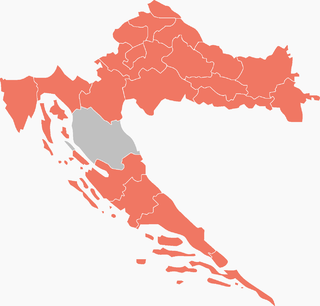
Stjepan "Stipe" Mesić is a Croatian lawyer and politician who served as President of Croatia from 2000 to 2010. Before serving two five-year terms as president, he was prime minister of SR Croatia (1990) after the first multi-party elections, the last president of the Presidency of Yugoslavia (1991) and consequently secretary general of the Non-Aligned Movement (1991), as well as speaker of the Croatian Parliament (1992–1994), a judge in Našice, and mayor of his hometown of Orahovica.

Ivica Račan was a Croatian politician who served as Prime Minister of Croatia from 2000 to 2003, heading two centre-left coalition governments.

Ivo Sanader is a Croatian former politician who served as Prime Minister of Croatia from 2003 to 2009. He is currently serving a prison sentence for corruption in Remetinec prison.

The Croatian Democratic Union is a major conservative, centre-right political party in Croatia. It is one of the two major contemporary political parties in Croatia, along with the centre-left Social Democratic Party (SDP). It is currently the largest party in the Sabor with 62 seats. The HDZ governed Croatia from 1990 before the country gained independence from Yugoslavia until 2000 and, in coalition with junior partners, from 2003 to 2011, and since 2016. The party is a member of the European People's Party (EPP). The HDZ's leader, Andrej Plenković, is the current Prime Minister of Croatia, having taken office following the 2016 parliamentary election.

This is the history of Croatia since the end of the Croatian War of Independence.

Jadranka Kosor is a Croatian politician and former journalist who served as Prime Minister of Croatia from 2009 to 2011, having taken office following the sudden resignation of her predecessor Ivo Sanader. Kosor was the first and so far only woman to become Prime Minister of Croatia since independence.
Zlatko Kramarić is a Croatian liberal politician from Osijek.

Parliamentary elections were held in Croatia on 25 November 2007 and for overseas voters on 24 and 25 November. The campaign officially started on 3 November. The President of Croatia announced elections on 17 October and 14 days were allowed for candidate lists to be submitted.

Zoran Milanović is a Croatian politician serving as President of Croatia since 19 February 2020. Prior to assuming the presidency, he was prime minister from 2011 to 2016 and president of the Social Democratic Party from 2007 to 2016.

Presidential elections were held in Croatia on 27 December 2009 and 10 January 2010. Twelve candidates participated in the first round, prior to a run-off between first-round winner Ivo Josipović and runner-up Milan Bandić. In the run-off, Josipović won a landslide victory, receiving 60.3% of the vote becoming the first elected president nominated by the Social Democratic Party of Croatia (SDP). The incumbent president Stjepan Mesić, who was first elected in 2000 as the candidate of the Croatian People's Party and re-elected in 2005 as an independent, was ineligible to seek re-election to a third term due to term limits.

Diplomatic relations between Croatia and Libya were established on March 30, 2000. Croatia has an embassy in Tripoli. Libya has an embassy in Zagreb.
Events from the year 2009 in Croatia.
The Croatia Forum, previously known as Croatia Summit, is an annual international conference held in Dubrovnik, Croatia since 2006 which focuses on Southeastern Europe.
Events from the year 2005 in Croatia.

The Eleventh Government of the Republic of Croatia was the Croatian Government cabinet led by Prime Minister Jadranka Kosor. It was announced on 6 July 2009 and its term ended on 23 December 2011. The cabinet came into existence after Prime Minister Ivo Sanader abruptly resigned on 1 July 2009, designating Kosor as his successor and making her the first woman to serve as Prime Minister since Croatia gained independence in 1991. It was succeeded by the Cabinet of Zoran Milanović following the centre-left Kukuriku coalition's success in the 2011 parliamentary elections.

The Tenth Government of the Republic of Croatia was the second of two Croatian Government cabinets led by Prime Minister Ivo Sanader. It was announced on 12 January 2008 and its term ended on 6 July 2009, when Jadranka Kosor formed the 11th cabinet following Sanader's surprise resignation. Cabinet members represented parties of the ruling coalition which was formed following the 2007 parliamentary elections:

A referendum on the EU accession of the Republic of Croatia was held on 22 January 2012. Croatia finished accession (membership) negotiations on 30 June 2011 and signed the Treaty of Accession on 9 December 2011, setting it on course to become the bloc's 28th member state. The Constitution of Croatia requires that a binding referendum be held on any political union reducing national sovereignty, such as via European Union membership. On 23 December 2011 the Croatian Parliament made a preliminary decision on EU accession and determined that the referendum would be held on 22 January 2012. The 2012 Croatian EU accession referendum was the first referendum held in Croatia since the Croatian independence referendum held more than 20 years earlier, in 1991.
The Twelve Generals' Letter was an open letter, signed by twelve generals of the Croatian Armed Forces, that criticized the government, politicians and media for perceived criminalization of the Croatian War of Independence and asserted that war veterans had suffered undignified treatment. On 29 September 2000, a day after the letter was published by the Croatian media, Croatian President Stjepan Mesić reacted by sending into forced retirement all seven of the signatories who were active-duty officers. The affair was a source of significant controversy in Croatia and is considered one of the key events in Mesić's ten-year presidential incumbency.

Igor Pokaz is a Croatian diplomat that has served as ambassador to NATO and Russia. He also served as Croatia's ambassador to the United Kingdom between September 2017 and May 2023.
Marijana Petir is a Croatian politician, former Member of the European Parliament.














